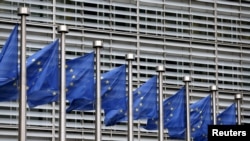ກຳມາທິການຢູໂຣບ ຫຼືພະແນກບໍລິຫານ ຂອງສະຫະພາບຢູໂຣບ ຫຼື EU ໄດ້ສະເໜີິແນະໃນວັນຈັນວານນີ້ ໃຫ້ສະມາຊິກ 27 ປະເທດຂອງກຸ່ມດັ່ງກ່າວອະນຸ ຍາດໃຫ້ພວກ ນັກທ່ອງທ່ຽວ ທີ່ໄດ້ຮັບການສັກຢາວັກຊີນ ທີ່ສະຫະພາບຢູໂຣບໃຫ້ການອະນຸມັດນັ້ນ ເຂົ້າປະເທດໄດ້ຢ່າງເຕັມທີ່.
ການເດີນທາງໄປຢູໂຣບໃນປັດຈຸບັນນີ້ ແມ່ນມີການຈຳກັດເປັນທີ່ສຸດ ນອກຈາກບໍ່ເທົ່າໃດປະເທດທີ່ມີອັດຕາການລະບາດຕ່ຳ ຮວມທັງອອສເຕຣເລຍ ນິວຊີແລນ ແລະເກົາຫຼີໃຕ້.
ໃນກອງປະຊຸມຖະແຫຼງຂ່າວ ທີ່ນະຄອນບຣັສເຊີລສ໌ ໂຄສົກຂອງກຳມາທິການຢູໂຣບ ທ່ານອາດາລເບີດ ຮານສ໌ (Adalbert Jahnz) ກ່າວວ່າ ຂໍ້ສະເໜີນີ້ແນະໃຫ້ບັນດາປະເທດສະມາຊິກ ອະນຸຍາດໃຫ້ຜູ້ເດີນທາງທີ່ບໍ່ຈຳເປັນ ຊຶ່ງສາມາດພິ ສູດໃຫ້ເຫັນວ່າ ເຂົາເຈົ້າໄດ້ສັກຢາວັກຊີນຄົບຖ້ວນແລ້ວກາຍ 14 ວັນກ່ອນການ ເດີນທາງໄປຮອດ ເຂົ້າປະເທດໄດ້.
ທ່ານຮານສ໌ ກ່າວວ່າ ນອກນັ້ນ ຍັງມີການຮຽກຮ້ອງໃຫ້ນຳໃຊ້ກົນໄກ “ການຫ້າມລໍ້ສຸກເສີນ” ເພື່ອປະສານງານກັນໃນລະດັບ EU ຊຶ່ງຈະຈຳກັດການເດີນທາງໄດ້ຢ່າງວ່ອງໄວ ຈາກປະເທດທີ່ບໍ່ແມ່ນສະມາຊິກຂອງ EU ຖ້າຫາກມີການສະແດງໃຫ້ເຫັນວ່າ ປະເທດເຫຼົ່ານັ້ນມີກໍລະນີເພີ້ມຂຶ້ນຢ່າງວ່ອງໄວຫຼືມີໄວຣັສສາຍພັນໃໝ່ໄດ້ຖືກພົບເຫັນຢູ່ທີ່ນັ້ນ.
ພາຍໃຕ້ຂໍ້ສະເໜີດັ່ງກ່າວນີ້ ບັນດາປະເທດສະມາຊິກຂອງ EU ຈະຮັບຮູ້ໃບຢັ້ງຢືນໃນການສັກຢາວັກຊີນທີ່ອອກໃຫ້ໂດຍເຈົ້າໜ້າທີ່ຂອງປະເທດທີ່ບໍ່ແມ່ນ EU ໂດຍນຳສະເໜີຂໍ້ມູນກ່ຽວຂ້ອງທັງໝົດແລະສາມາດພິສູດໄດ້. ນອກນັ້ນບັນດາປະເທດສະມາຊິກຍັງສາມາດເລືອກເອົາຜູ້ເດີນທາງທີ່ໄດ້ຮັບການສັກຢາວັກຊີນແລ້ວ ທີ່ໄດ້ຮັບການອະນຸມັດໃຫ້ນຳໃຊ້ສຸກເສີນໂດຍອົງການອະນາໄມໂລກ.
ຂໍ້ສະເໜີດັ່ງກ່າວມີທ່າທາງວ່າ ຈະເປັນຂ່າວດີສຳລັບບັນດາປະເທດໃນຢູໂຣບ ທີ່ເສດຖະກິດຂອງພວກເຂົາເຈົ້າເພິ່ງພາການທ່ອງທ່ຽວຢ່າງໜັກ ໂດຍສະເພາະປະເທດທີ່ຢູ່ທາງພາກໃຕ້ຂອງຢູໂຣບໃນຂະນະທີ່ລະດູຮ້ອນພວມຄືບຄານເຂົ້າມາຢູ່ນີ້.
ສະພາຢູໂຣບ ແລະເອກອັກຄະລັດຖະທູດຂອງບັນດາປະເທດສະມາຊິກຄາດວ່າຈະພິຈາລະນາຂໍ້ສະເໜີດັ່ງກ່າວ ໃນອາທິດນີ້. ກຳມາທິການຢູໂຣບຫວັງວ່າ ມັນຈະໄດ້ຮັບການອະນຸດແລະມີການຈັດຕັ້ງປະຕິບັດພາຍໃນວັນທີ 1 ມິຖຸນານີ້.
The European Commission, the European Union’s executive branch, recommended on Monday that the bloc’s 27 member states allow entry to fully vaccinated travelers who have received an EU- approved vaccine.
Travel to the EU is currently extremely limited except for a handful of countries with low infection rates, including Australia, New Zealand and South Korea.
At a news conference in Brussels, European Commission spokesman Adalbert Jahnz said the proposal recommends member states allow in nonessential travelers who can prove they have been fully vaccinated more than 14 days before arrival.
Jahnz said it also calls for an “emergency brake” mechanism to be coordinated at the EU level, which would quickly limit travel from a non-EU country should it show a sudden spike in cases or if a particularly virulent variant of the virus is discovered there.
Under the proposal, EU countries would accept vaccination certificates issued by authorities in non-EU countries, provided those certificates contain all relevant data and are verifiable. Member states could also individually choose to accept travelers who received vaccines approved for emergency use by the World Health Organizations.
The proposal is likely to be welcome news to European nations with economies that rely heavily on tourism, particularly those in southern Europe as the summer season approaches.
European Council and member state ambassadors are expected to consider the proposal this week. The commission hopes it could be approved and put in place by June 1.




